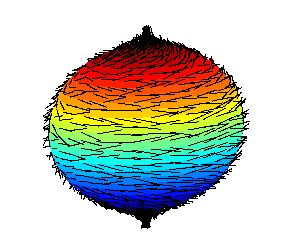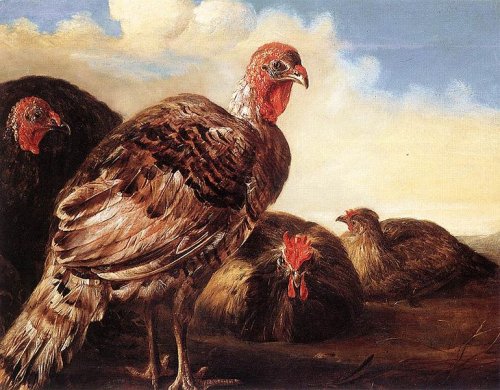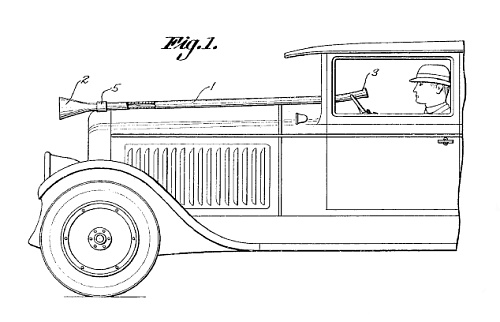mancinism
n. the condition of being left-handed
The Hairy Ball Theorem

A hairy ball can’t be combed flat — it must always have a cowlick.
This result arose originally in algebraic topology, but it has intriguing applications elsewhere. For example, it can’t be windy everywhere at once on Earth’s surface — at any given moment, the horizontal wind speed somewhere must be zero.
Bunk?
These have been in my notes for years — I can’t conclusively disprove them, but I have my doubts:
- In 1930 four Germans bailed out of a glider inside a thundercloud over the Rhön Mountains, were carried upward by their parachutes into a region of supercooled vapor, and froze to death.
- The monument to Jose Olmedo in Guyaquil, Ecuador, is actually a secondhand statue of Lord Byron, substituted because the town had no money. (Also: Cuzco, Peru, is rumored to have a statue of Chief Powhatan rather than Atahualpa.)
- A surprising number of sources claim that Mississippi spent a fifth of its revenues on artificial limbs in 1866.
- In 1902 Germany manufactured a “Goethemobile” in honor of the poet. (I really hope this is true.)
Debunk/rebunk/semi-unbunk as you please.
Catching Rays
In 1984, Bob Ellis, managing editor of the Eldorado, Ill., Daily Journal, announced a contest “to recognize and honor the American summer tradition, Daylight Saving Time.”
“The rules are simple,” Ellis wrote. “Beginning with the first day of Daylight Savings Time this year, those entering the contest must begin saving daylight. Whoever saves the most daylight … will be awarded prizes.”
He arranged for the contest to end on April 1, and hoped he had inserted enough absurdities that readers would see the joke. No pre-dawn light or twilight would be accepted, and moonlight was disallowed. Contestants could store their light in any container and deliver it to the Journal’s office. “All entries will be donated to less fortunate nations that do not observe Daylight Saving Time.”
But they didn’t. Ellis was contacted by media in San Francisco, New York, Chicago, Dallas, “every section of the nation” seeking more information about the contest.
That was all right with Ellis. He’s written the piece as “change of pace from the usual and often gloomy side of the news,” he said, so that people “could laugh at the world, and me, and perhaps even at themselves, with reckless abandon. And feel good. And therein lies the worth of such a diversion.”
Turkey Drives

George Hanger, an eccentric friend of George IV, once wagered £500 that 20 turkeys could outrace 20 geese over a course of 10 miles. The turkeys held a lead of as much as two miles for the first three hours, but toward evening they wandered off the road and began to roost.
“In the mean time, the geese came waddling on, and in a short time passed the turkey party, who were all busy in the trees dislodging their obstinate birds; but as to any further progress, it was found impossible, and the geese were declared the winners.”
In 1866, desperate for cash after a fire destroyed his hardware store in Placerville, Calif., Henry C. Hooker bought 500 turkeys and drove them over the Sierra Mountains to Carson City, Nev., where he sold them at a great profit to silver miners. (The turkeys took flight while descending a particularly steep precipice: “As I saw them take wing and race away through the air I had the most indescribable feeling of my life. I thought here is good-bye turkeys!”) He used the money to establish a new life as an Arizona stockman.
“Fifty Years Hence”
In 1932, Winston Churchill wrote an article for Popular Mechanics examining the technological promise of the coming half-century:
- “Wireless and television would enable their owner to connect up to any room similarly equipped and hear and take part in the conversation as well as if he put his head in through the window.”
- “Vast cellars, in which artificial radiation is generated, may replace the cornfields and potato patches. Parks and gardens will cover our plowed fields.”
- “We shall escape the absurdity of growing a whole chicken in order to eat the breast or the wing, by growing these parts separately.”
- “A few years ago London was surprised by a play called Rossum’s Universal Robots. The production of such beings may well be possible within fifty years. They will not be made, but grown under glass.”
- “There seems little doubt that it will be possible to carry out the entire cycle which now leads to the birth of a child, in artificial surroundings. Interference with the mental development of such beings, expert suggestion and treatment in the earlier years, would produce beings specialized to thought or toil.”
- If the potential of nuclear power were realized, “we could make an engine of six hundred horsepower weighing twenty pounds and carrying fuel for a thousand hours in a tank the size of a fountain pen.”
“Mankind has sometimes traveled forward and sometimes backward, or has stood still for hundreds of years,” he wrote. “Now it is moving very fast.”
Furry Testimony
As the lower animals were anciently amenable to law in Switzerland, so, in peculiar circumstances, they could be received as witnesses. A similar law, it appears, is still, or was to a very late period, recognised in Savoy. If a man’s house was broken into between sunset and sunrise, and the owner of the house killed the intruder, the act was considered a justifiable homicide. But it was considered just possible that a man, who lived all alone by himself, might invite or entice a person, whom he wished to kill, to spend the evening with him, and after murdering his victim, assert that he did it in defence of his person and property, the slain man having been a burglar. So when a person was killed under such circumstances, the solitary householder was not held innocent unless he produced a dog, a cat, or a cock that had been an inmate of the house, and witnessed the death of the person killed. The owner of the house was compelled to make his declaration of innocence on oath before one of these animals, and if it did not contradict him, he was considered guiltless, the law taking for granted the Deity would cause a miraculous manifestation by a dumb animal rather than allow a murderer to escape from justice.
— William Jones, Credulities Past and Present, 1880
Road Talk

In 1930 one found it vexing to pilot one’s Bugatti through the multitude in time for the first-act curtain. Happily Eugene L. Baker invented this “automobile attachment,” through which one might address the vulgar without deserting one’s foie gras:
This invention relates to an attachment for automobiles and more especially for closed vehicles, one of the objects being to provide a simple and efficient device by means of which the driver of the vehicle can speak to persons in front thereof, thereby to facilitate traffic.
The device doesn’t appear to accommodate two-way communication. Pity, isn’t it?
SRO
Here is a curious problem. We may safely assume that you had two parents; each of your parents had two parents, so that you had four grandparents. Arguing along similar lines you must have had eight great grandparents and so on. Assuming an average of three generations per century the number of your ancestors since the Christian Era began must have been nearly 1 trillion–
1,000,000,000,000,000,000 or 1018
This is vastly more people than have ever lived on the Earth. What can we do about it?
— J. Newton Friend, Numbers: Fun & Facts, 1954
Hearing Places
Architect Stedman Whitwell thought it illogical and confusing that different towns sometimes have the same name. He suggested assigning a unique name to each location based on its latitude and longitude. He published this table in the New Harmony, Ind., Gazette in 1826:

Insert an S to indicate south latitude and a V for west longitude; omit them for north and east. Thus New Harmony (38°11’N, 87°55’W) would be rechristened Ipba Veinul; New York would be Otke Notive, Washington D.C. Feili Neivul, and Pittsburgh Otfu Veitoup.
What these names lack in poetry they make up in utility: a traveler given the name of a town can immediately infer its location. Unfortunately, Whitwell’s scheme never caught on — and today the United States has 28 Springfields, 29 Clintons, and 30 Franklins.
